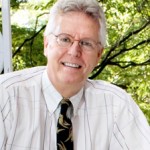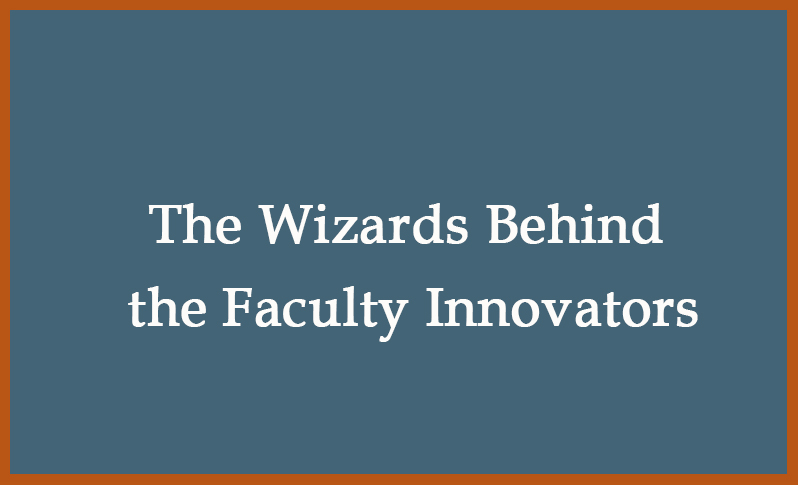Just as Oz couldn’t function without the wizard behind the scenes, so our Faculty Innovators program—discussed in the previous post—could not operate without the guidance of an Executive Committee (EC). As mentioned before, we have a three-person EC, consisting of the director of the Noel Studio and the two co-directors of the Teaching & Learning Center.
The key to the EC is contained in another previous post called “Tuesday Morning” (where interestingly we refer to how “we had to prepare a final draft for a program we call Faculty Innovators”); here, we detailed how for the past four years the three of us have set up a regular meeting. To recapitulate, we hold a weekly meeting (Tuesdays) at the same time (now 8:00-9:30 as we have to adjust for semester schedules) with an agenda that each of us has constructed during the week (Charlie, for instance, keeps a note pad on his desk where he jots down ideas during the week that need a group discussion, while Rusty prefers to record his items on his Mac). While not all of our conversation revolves around the Faculty Innovators program, we have noticed that in this the first semester of its actuality, 25% of our Tuesday meetings are devoted to operating this program. What do we discuss?
Related Reading: Faculty Innovators: The Key to the Future of Faculty Development
Vision. The entire Faculty Innovator program was born of a brainstorming session, so it is quite appropriate that we continue elaborating on that vision. Right now, for instance, Tuesday’s EC meetings have focused on what documents do we need both for the perpetuation of the FI program and for administrators such as deans and our Provost to be able to obtain. A few weeks ago we created job descriptions for the Faculty Innovators and the FI Coordinator, placing both on our FI website (the subject of an upcoming post). Why, you ask, didn’t we start the entire program with such descriptions? We did, but we since so much of this program is a “learn by going where you have to go” process, we have constantly updated our descriptions from last spring with new details as the actualities of the job unfold.
Assessment. As the semester nears its end, we need evidence of our program’s effect upon the faculty. Along the way, we have collected necessities such as attendance records and actual consultations performed as well as inventing certificates to hand out to faculty for their professional development records. A while ago we developed an assessment form that is sent to each PLC participants. All this data tell us we need to continue to design and implement faculty development—programming representative of the teaching and learning on campus and where we would like to go in the future with pedagogy, collaboration, and technology, for example.
Retreat. In early January before the spring semester begins, we need everyone to come together. Our main job will be to analyze the data so as to send a report to our superiors. Having all the FIs present ensures their data is available, and we have many points of view to brainstorm our conclusions. Specifically, as with every FI meeting, we will use Google documents to write and record our conversation. We also have to train the group periodically. This January, for instance, we will be starting classroom observation strategies.
Teaching & Learning Innovations Series. Every semester we post on multiple sites our schedule of workshops and other events. Some of these events are generated in our bi-weekly FI meetings that we plan with the FI Coordinator, but the bulk of them come from the three of us. We present them at the next FI meeting and allow for elaboration, the choosing of a date for the workshop, a blurb about it, and the choice of a facilitator. We also try to align these workshops with our so-called milestone events (discussed in a previous post)—New Faculty Orientation, the Provost’s Speaker Series, Scholarship Week, and Pedagogicon 2016.
Delivery Platform. At the moment, because of our “learn by going where we have to go” process, we do not have a single platform to serve as a repository of everything we do. The FIs do have a website, but right now it’s most for internal use of the FIs, not the faculty. We have a You Tube channel with at the moment only three videos. We also have a proprietary website on BlackBoard called MENTOR that allows us to deliver our modular training (all new and part-time faculty, for instance, are given access to our one-hour module on College Teaching, which they must complete before the end of the fall semester—something else that becomes part of our assessment. What we need, however, is one, simplified platform for all faculty. For that, the Provost has convened a cross-campus committee to investigate what can and should be done. Rusty convenes that committee, so whatever we discuss on Tuesdays, we know is brought to the committee.
Writing. The entire Faculty Innovator experience is the subject of a book we’re writing. Guess who the editors and chief writers are?
Day-to-Day Matters. Somebody has to go to each PLC facilitator to find out what resources are needed—books, food, research. Somebody has to oversee whether the PLCs and workshops actually meet and whether records of these events are turned in. Somebody has to preview these books as to cost and appropriateness. Somebody has to keep track of the budget and how we are progressing with allotted funds throughout the year. We also facilitate a Creative Community (CC)–which meeting bi-weekly through the fall, winter, spring and summer terms–has evolved into fiction writers actually writing and publishing books—somebody has to figure out how to evaluate that CC. In all cases that “somebody” is the Executive Committee.
Author
 Ph.D Hal Blythe writes literary criticism to mystery stories. In addition to the eleven books he’s published with New Forums, Hal has collaborated on four books on a variety of subjects, over 1000 pieces of fiction/nonfiction, and a host of television scripts and interactive mysteries performed by their repertory company. He is currently co-director of the Teaching and Learning Center for Eastern Kentucky University. Meet Hal Blythe.
Ph.D Hal Blythe writes literary criticism to mystery stories. In addition to the eleven books he’s published with New Forums, Hal has collaborated on four books on a variety of subjects, over 1000 pieces of fiction/nonfiction, and a host of television scripts and interactive mysteries performed by their repertory company. He is currently co-director of the Teaching and Learning Center for Eastern Kentucky University. Meet Hal Blythe.



